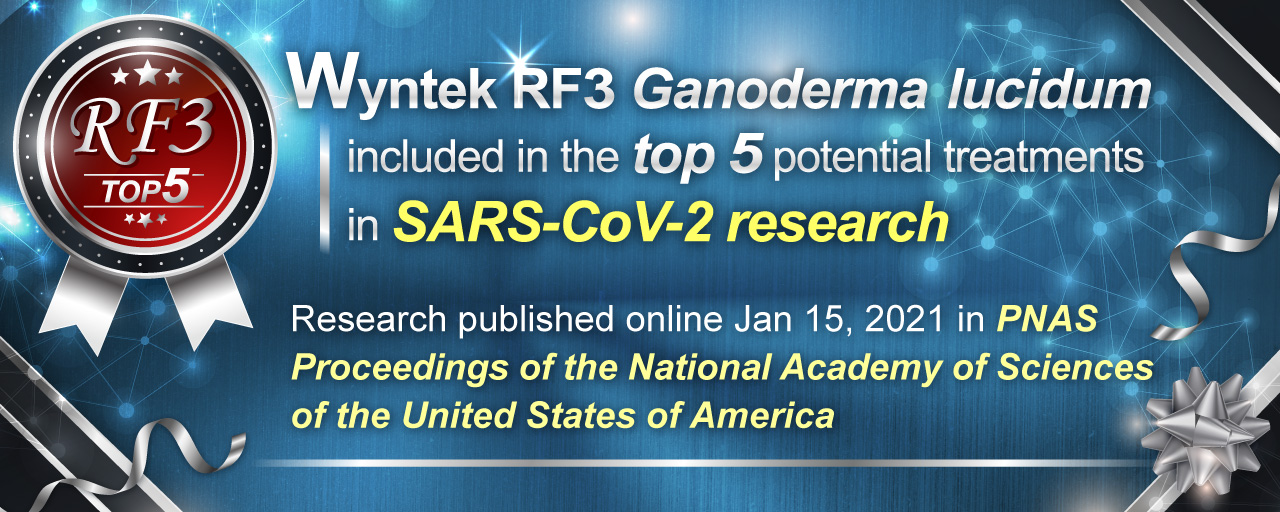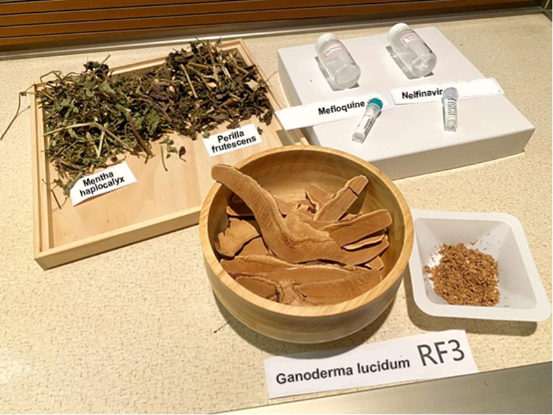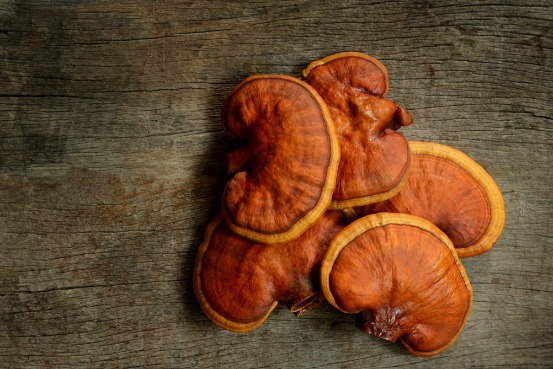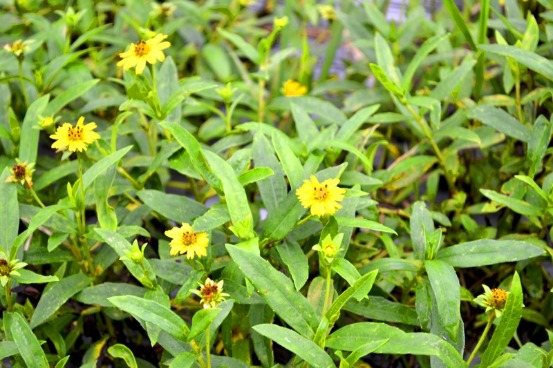
Natural materials have been used as medical treatment, herbal medicine, and food supplements for centuries. Wyntek Corporation is committed to develop products, from natural ingredients, that benefit human health. Wyntek has obtained exclusive patented licensing agreements from the leading research institute in Taiwan, using them to develop several dietary supplements. In addition, Wyntek focuses on the research and development of natural ingredients for various studies and applications.

The Academia Sinica confirmed 5 existing pharmaceuticals and herbal dietary supplements have the potential to fight the Coronavirus.
Click here for full article in Taipei Times
In June 2005, Wyntek invested in the research of Ganoderma lucidum polysaccharide RF3® and obtained an exclusive global patented technology license for Ganoderma lucidum F3® Fraction from the highest leading research institute in Taiwan. Wyntek has successively obtained more than 9 invention patents around the world and has produced and sold RF3® in the United States, Japan, and other countries.
Ganoderma lucidum is a well-known herbal medicine used for thousands of years. Many consumers mistakenly believe that the higher polysaccharide content means stronger active ingredients. In fact, not all Ganoderma lucidum polysaccharides are active. The Ganoderma lucidum polysaccharide RF3® is extracted from the third fraction which has the most biologically active form of Ganoderma lucidum, for the highest quality and maximum health benefit.
Ganoderma lucidum Polysaccharides F3 Fraction – Research and Application

Scientists at the highest leading research institute in Taiwan identified a fucose-containing glycoprotein fraction (F3 Fraction) from Ganoderma lucidum that exhibits immunomodulating activities. Recent experimental results indicate that F3 Fraction can stimulate the growth of stem cells from umbilical cord blood in vitro, as well as induce differentiation of plasma cells and dendritic cells.
In June 2005, Wyntek Corporation signed an exclusive licensing agreement with the highest leading research institute in Taiwan for all extracted technologies and patented applications related to Ganoderma lucidum Polysaccharide F3 Fraction. Wyntek Corporation also continues to collaborate with research institutes in Taiwan as well as globally on the studies and development of F3 Fraction and related technology. This technology has been granted multiple patents in the U.S. and Taiwan, including:
US Patent: 7,135,183, 7,323,176, 7,560,114, 7,687,064, 7,785,600, 7,947,283, 8,071,105 Taiwan Patent: I 281399, I 606835 There are currently 9 patents in total and several global patents pending.
Wyntek has also developed a proprietary manufacturing process to mass produce Ganoderma lucidum Polysaccharide F3 Fraction for commercial use.
Wedelia chinensis extract – Research and Application

Scientists at the highest leading research institute in Taiwan found that natural phytocompounds from Wedelia chinensis extract may have potential health benefits. Studies have confirmed that Wedelia chinensis extract contains Wedelolactone, Luteolin, Apigenin and other natural plant ingredients that can synergistically suppress harmful agents in the human body. Furthermore, there are virtually no toxins in this natural extract making it extremely safe and an ideal target for research. In October 2008, Wyntek acquired an exclusive license from the highest leading research institute in Taiwan on the use of Wedelia chinensis along with the proprietary technology and formulation of its synergistically active phytocompounds. This extraction method and the use of Wedelia chinensis extract has obtained a number of patents in various countries around the world as listed below:
U.S. Patent: 8,597,701, 9,144,591, 9,149,458
Taiwan Patent: I 324521, I 405966, I 581799
China Patent: ZL 2007 1 0109268.9, ZL 2015 1 0833578.X
Korea Patent: 10-1660672 Japan Patent: No. 6013578
Canada Patent: 2,918,532 European Patent: 3053629
Hong Kong Patent: HK 1222344
There are currently 13 patents and several global patents pending.
Relevant Reference of F3
- Studies on the immuno-modulating and anti-tumor activities of Ganoderma lucidum (Reishi) polysaccharides. Chen HS, Tsai YF, Lin S, Lin CC, Khoo KH, Lin CH, Wong CH. Bioorg Med Chem. 2004 Nov 1;12(21):5595-601. doi: 10.1016/j.bmc.2004.08.003.
- Extract of Reishi polysaccharides induces cytokine expression via TLR4-modulated protein kinase signaling pathways. Hsu HY, Hua KF, Lin CC, Lin CH, Hsu J, Wong CH. J Immunol. 2004 Nov 15;173(10):5989-99. doi: 10.4049/jimmunol.173.10.5989.
- Reishi polysaccharides induce immunoglobulin production through the TLR4/TLR2-mediated induction of transcription factor Blimp-1. Lin KI, Kao YY, Kuo HK, Yang WB, Chou A, Lin HH, Yu AL, Wong CH. J Biol Chem. 2006 Aug 25;281(34):24111-23. doi: 10.1074/jbc.M601106200.
- Ganoderma lucidum polysaccharides in human monocytic leukemia cells: from gene expression to network construction. Cheng KC, Huang HC, Chen JH, Hsu JW, Cheng HC, Ou CH, Yang WB, Chen ST, Wong CH, Juan HF. BMC Genomics. 2007 Nov 9;8:411. doi: 10.1186/1471-2164-8-411.
- Ganoderma lucidum polysaccharides enhance CD14 endocytosis of LPS and promote TLR4 signal transduction of cytokine expression. Hua KF, Hsu HY, Chao LK, Chen ST, Yang WB, Hsu J, Wong CH. J Cell Physiol. 2007 Aug;212(2):537-50. doi: 10.1002/jcp.21050.
- The interaction of lipopolysaccharide with membrane receptors on macrophages pretreated with extract of Reishi polysaccharides measured by optical tweezers. Wei MT, Hua KF, Hsu J, Karmenyan A, Tseng KY, Wong CH, Hsu HY, Chiou A. Opt Express. 2007 Aug 20;15(17):11020-32. doi: 10.1364/oe.15.011020.
- Ganoderma lucidum Polysaccharides Induce Macrophage-Like Differentiation in Human Leukemia THP-1 Cells via Caspase and p53 Activation. Hsu JW, Huang HC, Chen ST, Wong CH, Juan HF. Evid Based Complement Alternat Med. 2011;2011:358717. doi: 10.1093/ecam/nep107.
- Profiling carbohydrate-receptor interaction with recombinant innate immunity receptor-Fc fusion proteins. Hsu TL, Cheng SC, Yang WB, Chin SW, Chen BH, Huang MT, Hsieh SL, Wong CH. J Biol Chem. 2009 Dec 11;284(50):34479-89. doi: 10.1074/jbc.M109.065961.
- The lifespan-promoting effect of acetic acid and Reishi polysaccharide. Chuang MH, Chiou SH, Huang CH, Yang WB, Wong CH. Bioorg Med Chem. 2009 Nov 15;17(22):7831-40. doi: 10.1016/j.bmc.2009.09.002.
- Effect of Reishi polysaccharides on human stem/progenitor cells. Chen WY, Yang WB, Wong CH, Shih DT. Bioorg Med Chem. 2010 Dec 15;18(24):8583-91. doi: 10.1016/j.bmc.2010.10.016.
- Immunomodulatory and adjuvant activities of a polysaccharide extract of Ganoderma lucidum in vivo and in vitro. Lai CY, Hung JT, Lin HH, Yu AL, Chen SH, Tsai YC, Shao LE, Yang WB, Yu J. Vaccine. 2010 Jul 12;28(31):4945-54. doi: 10.1016/j.vaccine.2010.05.037.
- Ling-Zhi polysaccharides potentiate cytotoxic effects of anticancer drugs against drug-resistant urothelial carcinoma cells. Huang CY, Chen JY, Wu JE, Pu YS, Liu GY, Pan MH, Huang YT, Huang AM, Hwang CC, Chung SJ, Hour TC. J Agric Food Chem. 2010 Aug 11;58(15):8798-805. doi: 10.1021/jf1020158.
- Immunization of fucose-containing polysaccharides from Reishi mushroom induces antibodies to tumor-associated Globo H-series epitopes. Liao SF, Liang CH, Ho MY, Hsu TL, Tsai TI, Hsieh YS, Tsai CM, Li ST, Cheng YY, Tsao SM, Lin TY, Lin ZY, Yang WB, Ren CT, Lin KI, Khoo KH, Lin CH, Hsu HY, Wu CY, Wong CH. Proc Natl Acad Sci U S A. 2013 Aug 20;110(34):13809-14. doi: 10.1073/pnas.1312457110.
- Fucose-containing fraction of Ling-Zhi enhances lipid rafts-dependent ubiquitination of TGFbeta receptor degradation and attenuates breast cancer tumorigenesis. Tsao SM, Hsu HY. Sci Rep. 2016 Nov 10;6:36563. doi: 10.1038/srep36563.
Relevant papers of W3
- Compounds from Wedelia chinensis synergistically suppress androgen activity and growth in prostate cancer cells. Lin FM, Chen LR, Lin EH, Ke FC, Chen HY, Tsai MJ, Hsiao PW. Carcinogenesis. 2007 Dec;28(12):2521-9. doi: 10.1093/carcin/bgm137.
- Herbal extract of Wedelia chinensis attenuates androgen receptor activity and orthotopic growth of prostate cancer in nude mice. Tsai CH, Lin FM, Yang YC, Lee MT, Cha TL, Wu GJ, Hsieh SC, Hsiao PW. Clin Cancer Res. 2009 Sep 1;15(17):5435-44. doi: 10.1158/1078-0432.CCR-09-0298.
- Dietary uptake of Wedelia chinensis extract attenuates dextran sulfate sodium-induced colitis in mice. Huang YT, Wen CC, Chen YH, Huang WC, Huang LT, Lin WC, Arulselvan P, Liao JW, Lin SH, Hsiao PW, Kuo SC, Yang NS. PLoS One. 2013 May 29;8(5):e64152. doi: 10.1371/journal.pone.0064152.
- Development of a standardized and effect-optimized herbal extract of Wedelia chinensis for prostate cancer. Tsai CH, Tzeng SF, Hsieh SC, Lin CY, Tsai CJ, Chen YR, Yang YC, Chou YW, Lee MT, Hsiao PW. Phytomedicine. 2015 Mar 15;22(3):406-14. doi: 10.1016/j.phymed.2015.01.013.
- A standardized herbal extract mitigates tumor inflammation and augments chemotherapy effect of docetaxel in prostate cancer. Tsai CH, Tzeng SF, Hsieh SC, Yang YC, Hsiao YW, Tsai MH, Hsiao PW. Sci Rep. 2017 Nov 15;7(1):15624. doi: 10.1038/s41598-017-15934-0.
- A Standardized Wedelia chinensis Extract Overcomes the Feedback Activation of HER2/3 Signaling upon Androgen-Ablation in Prostate Cancer. Tsai CH, Tzeng SF, Hsieh SC, Tsai CJ, Yang YC, Tsai MH, Hsiao PW. Front Pharmacol. 2017 Oct 10;8:721. doi: 10.3389/fphar.2017.00721.
